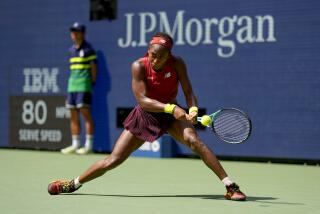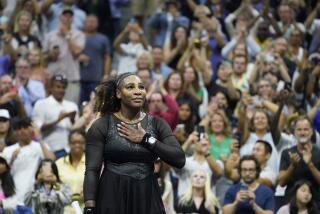After 16 in Row, It’s No Longer Sweet 16 at the Open for Evert
- Share via
NEW YORK — With few exceptions over the years, Chris Evert and the U.S. Open have been a study in compatibility. Add the date Wednesday Sept. 9, 1987 and the name Lori McNeil to that list of exceptions.
The third-seeded Evert, 32, lost in the quarterfinals to the 11th-seeded McNeil, 3-6, 6-2, 6-4.
Thus, two exceptional streaks came to a halt for one exceptional women’s tennis player at Flushing Meadow:
--McNeil ended Evert’s run of 13 straight years with at least one Grand Slam tournament title. This year, Evert skipped the Australian Open with an injury and lost in the semifinals of the French Open and Wimbledon.
--McNeil also ended Evert’s U.S. Open record of 16 straight years of having reached at least the semifinals.
From the day Chris Evert arrived at the 1971 U.S. Open, then played at Forest Hills, she has been, to slightly varying degrees, an annual success story.
In her Open debut, at 16, she reached the semifinals before losing to Billie Jean King. Then, Evert won six Open singles championships, and prior to Wednesday, she had never lost before the semifinals in 16 years.
Between 1971 and Wednesday, Evert encountered a couple of bad days in the U.S. Open, most recently her semifinal loss to Helena Sukova last year and a semifinal setback to eventual champion Hana Mandlikova in 1985.
And then, there she was Wednesday, in her 17th U.S. Open, crumbling under a barrage of volleys by the younger McNeil, 23.
Unlike 1986, when Evert appeared visibly disturbed by the loss to Sukova and later escaped to the women’s dressing room to cry, this time, she steeled herself and marched into the interview room to meet the press right after the defeat.
Someone commented that Evert didn’t seem as distraught this time by the unexpected result.
“What do you want me to do, start crying in front of you people?” she asked.
If anything, her effort against McNeil was enough to make anyone cry. Evert lost her serve five times in the third set.
But Evert seldom hands over a match to an opponent. Even her sub-par efforts force the other player to win the match. And McNeil did so by taking over the net, coming in on 90 occasions and winning 46 of those points. The final point was no different, as McNeil rushed the net and won the match with a sharply angled backhand volley.
“I guess that’s what happens when you get old,” said Evert, who was the third-seeded player. “You have a few more bad days. And today was a bad day.”
Actually, Evert’s play of late had given her reason to look forward to the final rounds of a Grand Slam tournament. At Manhattan Beach, she handed Navratilova one of the most one-sided defeats in their rivalry, losing just three games in their semifinal meeting last month. Then, she gave Steffi Graf a good fight in the final before losing 6-3, 6-4.
McNeil, who lost to Evert, 6-1, 7-5, at Manhattan Beach, felt that age and the weight of Evert’s accomplishments might have given her the advantage this time.
“I felt this is the time to beat Chris, in the quarterfinals,” said McNeil, of Houston. “I think if it were the finals, I don’t think she would feel as much pressure. I felt I had a great chance. I played very well.”
So, is the world ready for a Lori McNeil appearance in the Stadium court? McNeil, whose exciting fourth-round match against Zina Garrison was relegated to an outside court, was saying thanks, but no thanks.
“No, I really like the Grandstand court,” she said. “I would rather stay there.”
McNeil indicated that she is just glad to still be in the tournament, having staved off two difficult opponents before meeting Evert. She needed a third-set tiebreaker to defeat Nicole Provis in the third round, and another to beat Garrison. In fact, McNeil faced two match points against Garrison, saving one with a net-cord winner.
“When Zina and I played, I was having a good time that day, too,” said McNeil, whose father, Charlie, played pro football for the Chargers. “Zina hits great shots and we had great points, we ran after everything. Beating Chris is much more than beating Zina. It’s different. Chris has so much history behind her.”
Evert felt, if she had been somewhat sharp, she would have been able to add another line to her long list of accomplishments.
“I played Lori three weeks ago in L.A. and I beat her in straight sets,” Evert said. “She played well . . . but I don’t think . . . how can I put this delicately? She played very well, but I think when I’m playing my normal game, I should still beat her playing when she plays like that.”
In short, an average Evert might have been able to reach the semifinals. But the average Evert effort doesn’t include three double-faults in one game in the decisive set. She accomplished that inglorious feat in the fourth game, hitting 7 of 8 serves into the net. And all were short, a sure sign of trouble.
“Well, I think the whole match my timing was off,” Evert said. “When I won the first set, 6-3, I felt like I didn’t play well at all. And Lori was just making a lot of errors. I don’t know, it was just one of those matches you hope doesn’t happen in a Grand Slam tournament. I couldn’t get going. I didn’t even hit my groundies well. So, she played a very smart match, but my bread-and-butter shots weren’t working.”
At least Evert, widely known as a gracious champion, was willing to give the other player some of the credit. McNeil’s semifinal opponent, top-seeded Steffi Graf of West Germany, received none from Pam Shriver. After No. 5 Shriver lost 6-4, 6-3 to Graf, she whined and spoke about how 4 or 5 volleys--if they had gone her way--would have given her the victory.
Actually, Shriver was fooling herself. Graf wouldn’t let her make the shots, keeping Shriver off-balance with terrific passing shots.
With the absence of Evert and Shriver in the draw, No. 2 Martina Navratilova felt she had to do something to stop the passing of the torch.
Navratilova, who plays No. 6 Sukova in the other semifinal Friday, fought off a set point in the opening set to defeat No. 8 Gabriela Sabatini of Argentina, 7-5, 6-3.
“With Chris losing after 16 years in a row in the semis here and Pam didn’t play so well against Steffi, I thought I had to do something for the old guard,” Navratilova said.
More to Read
Go beyond the scoreboard
Get the latest on L.A.'s teams in the daily Sports Report newsletter.
You may occasionally receive promotional content from the Los Angeles Times.











